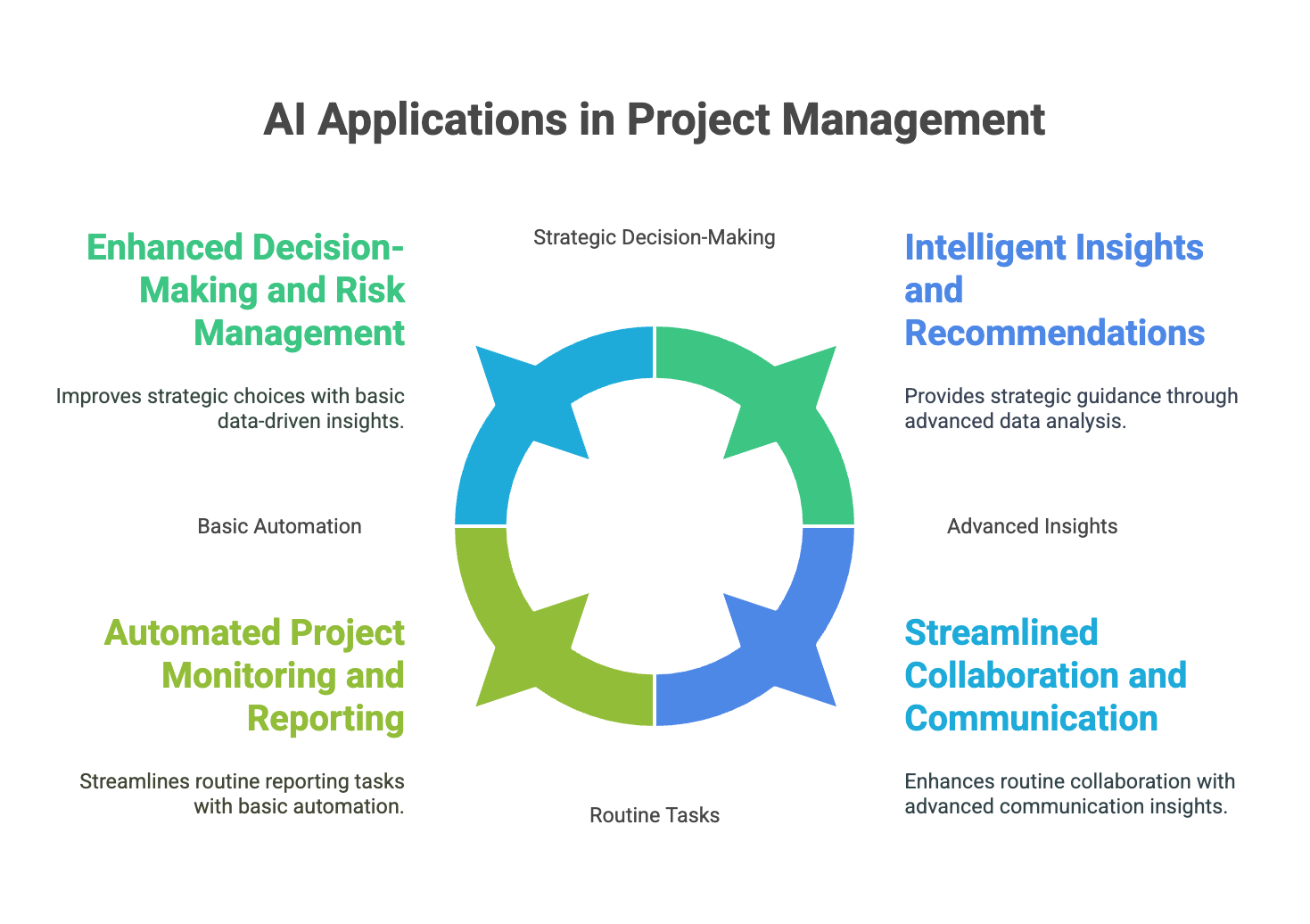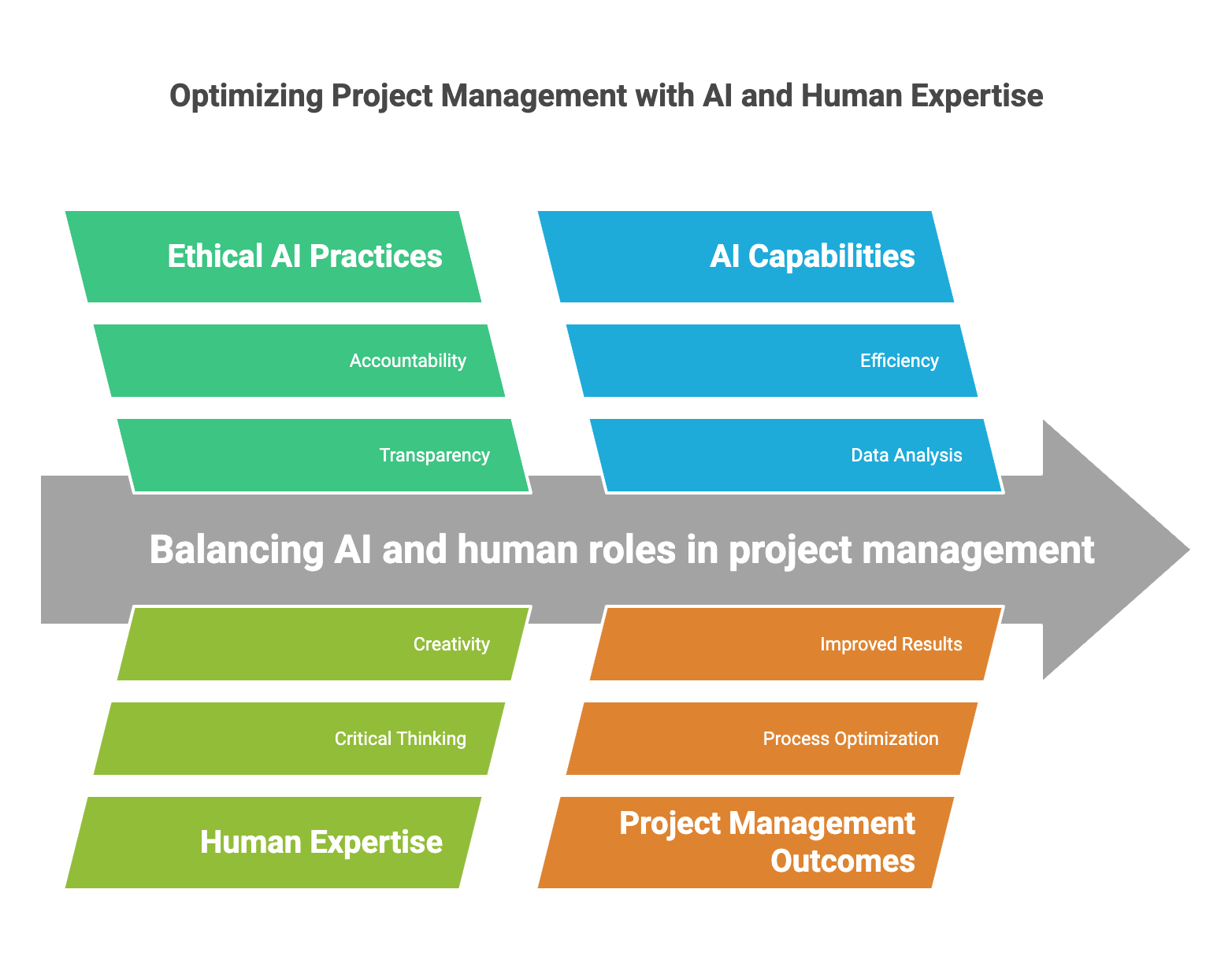The integration of Artificial Intelligence (AI) into Project Management practices has become a transformative force. AI has the potential to revolutionize decision-making, resource allocation, collaboration, and automation in the profession. This article will explore the groundbreaking ways in which AI is set to revolutionize Project Management and hopefully inspire practitioners and organizations on how to apply it to their current projects and programs.
4 Ways AI is Revolutionizing Project Management

1. Enhanced Decision-Making and Risk Management
AI's impact on Project Management is significant across the entire project life cycle. By analyzing vast amounts of data and employing advanced analytics, AI algorithms provide real-time insights and predictive models that enhance decision-making. Project managers can leverage historical data, identify patterns, and consider multiple variables to make informed choices at each stage of the project. From project initiation to closure, AI-driven tools support strategic decision-making and optimize project outcomes.
Furthermore, AI offers valuable benefits in project portfolio management and risk management. In project portfolio management, AI algorithms utilize data from the organization and its environment to prioritize projects effectively. By considering factors such as resource availability, market trends, and business objectives, project managers can align the portfolio with organizational goals, maximizing value. Additionally, AI-driven risk management tools help project managers proactively identify and address potential issues. By analyzing historical project data, detecting risk patterns, and considering external factors, AI enables timely risk mitigation, ensuring projects stay on track and deliver successful outcomes.
Overall, the integration of AI into Project Management empowers decision-makers by providing real-time insights, predictive models, and enhanced risk management capabilities. Project managers can make data-driven decisions, prioritize projects effectively, and proactively address risks throughout the project life cycle.
2. Intelligent Resource Allocation and Planning
AI can greatly assist in analyzing project requirements and enhancing their clarity while eliminating inconsistencies. By utilizing natural language processing (NLP) techniques, AI algorithms can analyze project documentation, identify key requirements, and identify any discrepancies or contradictions. This helps project managers ensure that the requirements are well-defined, unambiguous, and aligned with the project goals. AI-powered tools can also provide recommendations and suggestions to refine and improve requirement specifications, resulting in a more precise and comprehensive understanding of project needs.
Furthermore, AI can leverage the analyzed requirements and available resources to prepare plans and schedules. By considering the project requirements, historical data, and resource availability, AI algorithms can generate optimized project plans and schedules. These plans can take into account various factors, such as task dependencies, resource constraints, and project priorities. AI-powered planning tools can automatically assign tasks, estimate durations, and create schedules that maximize efficiency and minimize conflicts. This ensures that projects are well-structured, realistic, and aligned with the available resources, leading to improved project performance and successful outcomes.
3. Streamlined Collaboration and Communication
While most Project Management tools provide automation features based on predefined conditions, AI-powered collaboration and communication offer additional capabilities that go beyond simple triggers. Here are a couple of ways in which AI-based collaboration differs:
Intelligent Insights and Recommendations: AI can analyze communication patterns, team interactions, and project data to provide intelligent insights and recommendations. For example, AI algorithms can identify bottlenecks, suggest alternative approaches, or recommend collaboration strategies based on historical data and real-time project information. These insights go beyond basic automation triggers and provide valuable guidance to project managers and teams, helping them make informed decisions and optimize collaboration.
Natural Language Processing (NLP) Capabilities: AI-driven collaboration tools often incorporate NLP capabilities that go beyond simple triggers. NLP allows for advanced text analysis, sentiment analysis, and understanding of context. This enables AI systems to interpret and extract meaning from written communication, facilitating more effective collaboration. For instance, AI can detect potential conflicts, identify key information in lengthy documents, or analyze team sentiment to gauge project progress and team dynamics.
AI offers intelligent insights, recommendations, and advanced NLP capabilities, enabling enhanced decision-making, optimized collaboration, and a deeper understanding of team dynamics. These AI-driven capabilities empower project managers and teams to improve project outcomes and productivity.
4. Automated Project Monitoring and Reporting
AI offers project managers the opportunity to automate routine tasks and streamline project monitoring and reporting processes. Through continuous monitoring of project data, AI algorithms detect anomalies, identify potential bottlenecks, and provide insights into project health and performance. Real-time reports and dashboards generated by AI enable project managers to stay informed and make timely adjustments. Automating project monitoring and reporting frees up valuable time for project managers, allowing them to focus on strategic decision-making and value-added activities that drive project success.
AI brings several benefits to project monitoring and reporting, going beyond automating routine tasks. One significant advantage is the ability to generate immediate project reports without human bias. AI algorithms can analyze project data in real-time and produce comprehensive reports on project status, risks, changes, and benefits realized. These reports provide objective insights and eliminate the subjective biases that can sometimes arise from manual reporting. By leveraging AI for reporting, project managers can access accurate and timely information, enabling them to make data-driven decisions and take proactive measures to address any issues or risks.
Additionally, AI can play a crucial role in compliance monitoring. Project managers often need to ensure that projects adhere to regulatory requirements and internal policies. AI-powered systems can continuously monitor project activities, compare them against established compliance standards, and alert project managers in case of any deviations. This proactive approach helps project managers maintain compliance, avoid penalties, and ensure that projects are aligned with legal and organizational requirements. By leveraging AI for compliance monitoring, project managers can mitigate risks and maintain a high level of governance throughout the project lifecycle.
Ethical Considerations and Human Expertise
While AI brings significant potential to Project Management, ethical considerations and human expertise must be taken into account. Ensuring ethical AI practices, such as transparency, fairness, and accountability, is essential. Human project managers possess unique skills, including critical thinking, creativity, and adaptability, that are invaluable in complex project environments. Combining the power of AI with human expertise and judgment creates a symbiotic relationship that optimizes project management processes and outcomes, leveraging AI's capabilities while capitalizing on the strengths of human project managers.

Conclusion
The integration of AI into Project Management practices presents remarkable opportunities for organizations and project managers. AI revolutionizes decision-making, risk management, resource allocation, collaboration, and automation in Project Management. It enhances decision-making processes by providing real-time insights and predictive models, optimizing the outcomes of projects at every stage. AI's intelligent resource allocation and planning capabilities streamline project requirements analysis, improve clarity, and optimize project plans and schedules based on available resources.
Additionally, AI-powered collaboration tools offer intelligent insights, recommendations, and advanced NLP capabilities, facilitating effective communication and collaboration among project teams. Furthermore, automated project monitoring and reporting powered by AI free up valuable time for project managers and ensure accurate, timely insights into project health and performance. However, while embracing the benefits of AI, ethical considerations and the expertise of human project managers must be valued to create a symbiotic relationship that optimizes Project Management processes and outcomes. By leveraging the power of AI while harnessing human expertise, organizations can truly revolutionize Project Management practices and achieve greater success with their projects and programs.